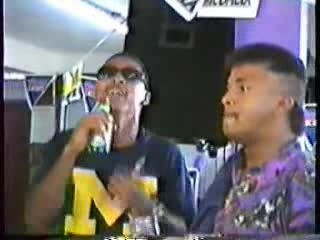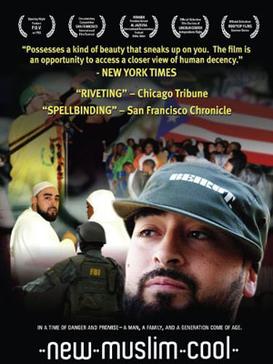Hamza Perez is a Puerto Rican former American rap artist who converted to Islam. He has been ranked as one of the 500 most influential Muslims in the world by the royal strategic Islamic center. Hamza spends his time on the streets and jail cells spreading the message of Islam to at-risk youth and communities. He was also a member of the hip-hop group M-Team, a music group that consisted of Hamza and his brother Suliman Perez. They used hip-hop to spread their faith and religious message to other young people. Hamza is the founder of the S.H.E.H.U. Program (Services Helping to Empower and Heal Urban Communities) and one of the co-founders of the Light of the Age Mosque in Pittsburgh, PA. He has also worked with the interfaith poetry project Crossing Limits. In 2009, PBS released a movie entitled "New Muslim Cool" about his life, music, and community. [1] [2] [3] [4] [5] [6] [7]
His conversion story is featured in "Latino Muslims: Our Journeys to Islam." [8]
Latin hip hop is hip hop music that is recorded by artists in the United States of Hispanic and Latino descent, along with Spanish-speaking countries in the Caribbean, North America, Central America, South America, and Spain.

Luis Armando Lozada Cruz, known by his stage name Vico C, is an American rapper, singer and record producer. Regarded as the founding father of reggaeton, Vico C has played an influential role in the development of Latin American hip hop and urban music.

Nuyorican is a portmanteau word blending "New York" and "Puerto Rican", referring to Puerto Ricans located in or around New York City, their culture, or their descendants. This term is sometimes used for Puerto Ricans living in other areas in the Northeastern US Mainland outside New York State as well. The term is also used by Islander Puerto Ricans to differentiate those of Puerto Rican descent from the Puerto Rico–born.

Reggaeton, is a modern style of popular and electronic music that originated in Panamá during the late 1980s, and which rose to prominence in the late 1990s and early 2000s through a plethora of Puerto Rican musicians. It has evolved from dancehall, with elements of hip hop, Latin American, and Caribbean music. Vocals include toasting/rapping and singing, typically in Spanish.

Tegui Calderón Rosario is a Puerto Rican rapper, singer and actor. He began his musical career in 1996 and was supported by the famous Puerto Rican rapper Eddie Dee, who invited him on his second studio album, El Terrorista de la Lírica, released in 2000. Calderón reached international success in 2003 with his first album, El Abayarde, which sold 300,000 copies worldwide and was nominated for a Latin Grammy Award. His importance in reggaeton music led him to participate in Eddie Dee's 12 Discípulos album in 2004. He released three more studio albums between 2006 and 2015, varying in styles, focusing more in hip hop and African music rather than reggaeton in The Underdog/El Subestimado (2006) and El Abayarde Contraataca (2007). His fourth studio album, El Que Sabe, Sabe, released in 2015, won a Latin Grammy Award for Best Urban Music Album. In the same year, he announced that he is planning a studio album alongside the Puerto Rican singer Yandel titled El Blanco y el Negro.
The Ghetto Brothers were a gang and music group founded in New York City's South Bronx in the late 1960s with the motivation to uplift young Latino and Black men in their community.

The Nuyorican movement is a cultural and intellectual movement involving poets, writers, musicians and artists who are Puerto Rican or of Puerto Rican descent, who live in or near New York City, and either call themselves or are known as Nuyoricans. It originated in the late 1960s and early 1970s in neighborhoods such as Loisaida, East Harlem, Williamsburg, and the South Bronx as a means to validate Puerto Rican experience in the United States, particularly for poor and working-class people who suffered from marginalization, ostracism, and discrimination.
The English language as primarily spoken by Hispanic Americans on the East Coast of the United States demonstrates considerable influence from New York City English and African-American Vernacular English, with certain additional features borrowed from the Spanish language. Though not currently confirmed to be a single stabilized dialect, this variety has received some attention in the academic literature, being recently labelled New York Latino English, referring to its city of twentieth-century origin, or, more inclusively, East Coast Latino English. In the 1970s scholarship, the variety was more narrowly called (New York) Puerto Rican English or Nuyorican English. The variety originated with Puerto Ricans moving to New York City after World War I, though particularly in the subsequent generations born in the New York dialect region who were native speakers of both English and often Spanish. Today, it covers the English of many Hispanic and Latino Americans of diverse national heritages, not simply Puerto Ricans, in the New York metropolitan area and beyond along the northeastern coast of the United States.
Hispanic and Latino American Muslims also known as Morisco Americans are Hispanic and Latino Americans who are adherents of the Islamic faith. Hispanic and Latino Americans are an ethnolinguistic group of citizens of the United States with origins in Spain and Latin America. Islam is an Abrahamic, monotheistic religion teaching that there is only one God (Allah), and that Muhammad is the last messenger of God. The primary scriptures of Islam are the Quran, the verbatim word of God, and the teachings and normative examples of Muhammad. Muslims believe that Islam is the complete and universal version of a primordial faith that was revealed many times before through prophets including Adam, Abraham, Moses and Jesus, and the Quran in its Arabic to be the unaltered and final revelation of God. The Spaniards took the Roman Catholic faith to Latin America via imperialism and colonialism; Roman Catholicism continues to be the largest, but not the only, religious denomination among most Hispanics. In contrast, the Arabs took Islam to very few Latin American countries such as Mexico, El Salvador, Guatemala and Colombia via post-independence immigration.

The Nuyorican Poets Cafe is a nonprofit organization in the Alphabet City neighborhood of Manhattan in New York City. It is a bastion of the Nuyorican art movement, and has become a forum for poetry, music, hip hop, video, visual arts, comedy, and theater. Several events during the PEN World Voices festival are hosted at the cafe.
Carlos Mandes, also known as DJ Charlie Chase, is a Puerto Rican DJ who played a key role in establishing Latinos as a contributing force in The Bronx's early hip hop culture. Hitting the hip hop scene in 1975, Chase was a founding member of The Cold Crush Brothers along with DJ Tony Tone and members Grandmaster Caz, JDL, EZ AD and Almighty Kay Gee. Chase and Tone were also responsible in forming the first ever MC convention in hip hop history in 1980.
Luis Cedeño, more commonly known as DJ Disco Wiz is an American DJ.

René Pérez Joglar, known professionally as Residente, is a Puerto Rican rapper, singer, songwriter and filmmaker. He is best known as one of the founders of the alternative rap band Calle 13. Residente released five albums with Calle 13 before announcing his solo career in 2015. Residente released his debut solo album in 2017. He has won four Grammy Awards and 28 Latin Grammy Awards—more than any other Latin artist. Residente has also delved into producing documentaries including Sin Mapa (2009) and Residente (2017) and has directed some of his own music videos.

New Muslim Cool is a 2009 documentary film directed and produced by Jennifer Maytorena Taylor. The film was initially released on POV and follows the life of Hamza Perez, a Puerto Rican American Rap artist who converted to Islam after he decided to quit his life as a drug dealer. Hamza spends his time on the streets and jail cells spreading the message of Islam to at-risk youth and communities. The film also features the hip-hop group M-Team, a musical collaboration between Hamza and his brother Suliman Perez. The duo utilize the medium of hip-hop to spread their faith and religious message to other young people. In the midst of his journey to establish a new religious community and a new family in the North side of Pittsburgh, Hamza is forced to face the reality of being an active Muslim in a post 9/11 America when the community's Mosque gets raided by the FBI.

Robert Torres, also known as Sabor Latino is an American hip hop artist and author. He is from Jamaica, Queens, New York. Sabor Latino creates music to inspire individuals to become productive members of society.
Khadijah Rivera founded the first organization, PIEDAD, for Latinas of the Islamic faith in 1988. She was a Puerto Rican Muslim convert from Roman Catholicism. She was married to an Egyptian Muslim. Khadijah Rivera was involved in some two dozen social causes. She encouraged members to become active in their mosques. During her life, she was a social activist and community worker. She taught at a local Tampa Bay school. She was a coordinator of Project Downtown Tampa, a project that helps the homeless and needy. In summer 2009, she began working at CAIR's Tampa office.
A number of hip hop artists in the United States are followers of Islam. Although some Muslims believe some or most forms of music are haram, these artists do not necessarily consider themselves as practicing orthodox Muslims.

María Isa Pérez-Vega is an American politician and musician serving in the Minnesota House of Representatives since 2023. A member of the Minnesota Democratic-Farmer-Labor Party (DFL), Pérez-Vega represents District 65B in the Twin Cities metropolitan area, which includes the cities of Saint Paul and West St. Paul and parts of Dakota and Ramsey Counties.